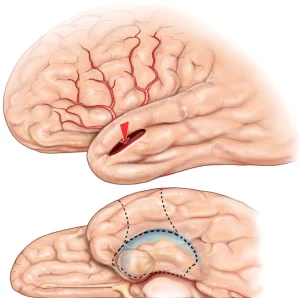Overview
Diagnosis
After a seizure, your healthcare professional reviews your symptoms and medical history to understand what may have caused it. Identifying the cause helps predict whether another seizure is likely. Several tests may be used during the diagnostic process.
A neurological exam evaluates behavior, motor abilities and mental function. This exam shows how well the brain and nervous system are working. Blood tests may be done to check for infections, electrolyte imbalances, blood sugar changes or genetic conditions that could trigger seizures.
An electroencephalogram, called an EEG, is commonly used to record electrical activity in the brain. Small electrodes placed on the scalp capture these signals, which appear as wavy lines. An EEG can identify patterns linked to epilepsy or help rule out conditions that mimic seizures.
Computerized tomography, or CT, uses X-rays to create cross-sectional images of the brain. This scan may detect bleeding, tumors or cysts that could cause seizures. Magnetic resonance imaging, or MRI, provides a more detailed view of brain structures using powerful magnets and radio waves. MRI results often help identify abnormalities that may be related to seizures.
Positron emission tomography, known as PET, uses a small amount of radioactive material to show areas of the brain that are more active. This can help pinpoint where a seizure starts. Single-photon emission computerized tomography, or SPECT, uses another type of radioactive tracer to create a 3D map of blood flow during a seizure. A specialized version called SISCOM may offer even more detailed insight.
Treatment
Not everyone who has a seizure needs immediate treatment, especially if it is a first-time event. Your healthcare professional may wait to see whether a second seizure occurs before starting therapy. When treatment is recommended, the goal is to control seizures with the fewest possible side effects.
Medications are often the first line of treatment for temporal lobe seizures. Although many options are available, seizures cannot always be fully controlled with medicines alone. Side effects such as dizziness, tiredness or weight gain are common. It is important to discuss potential interactions with other medicines, including birth control pills, as some antiseizure drugs can reduce their effectiveness.
Dietary therapy may help some people manage seizures. A ketogenic diet, which is high in fat and very low in carbohydrates, has been shown to reduce seizure activity. However, it can be difficult to maintain because of its strict food limitations. Other diet variations, such as low glycemic index or modified Atkins plans, may offer some benefit and are still being studied.
When medicines do not control seizures, surgical or device-based treatments may be considered. Epilepsy surgery aims to remove the part of the brain where seizures begin. In some cases, MRI-guided laser therapy may be used as a less-invasive alternative. Surgery is generally most effective for seizures that consistently start in a single brain region. It may not be an option if seizures come from several areas or from areas responsible for essential functions such as speech or memory.
Other procedures include vagus nerve stimulation, in which a device placed under the skin sends signals to the brain to reduce seizure activity. Responsive neurostimulation involves a device that detects early seizure activity and delivers electrical stimulation to stop it. Deep brain stimulation uses electrodes placed in specific brain areas to help regulate abnormal activity.
Pregnancy requires careful planning for people with epilepsy. Some antiseizure medicines, such as valproic acid, carry risks of cognitive issues or neural tube defects in babies and are generally avoided. Work with your healthcare professional before becoming pregnant to adjust medicines safely. Some people may need dosage changes during pregnancy to maintain seizure control while minimizing risks.
Birth control can also be affected by certain antiseizure medicines. If your medicine reduces the effectiveness of hormonal birth control, you may need alternative methods. Discuss these options with your healthcare professional to ensure both seizure management and pregnancy prevention remain effective.
Advertisement

